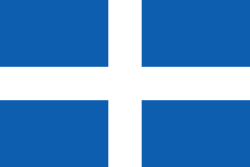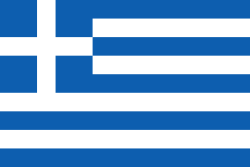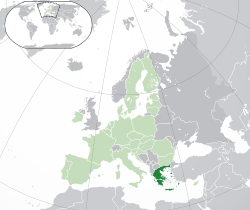Top Qs
Timeline
Chat
Perspective
Third Hellenic Republic
Current state of Greece, established after the fall of the Military Junta in 1974 From Wikipedia, the free encyclopedia
Remove ads
The Third Hellenic Republic (Greek: Γ΄ Ελληνική Δημοκρατία, romanized: Triti Elliniki Dimokratia) is the period in modern Greek history that stretches from 1974, with the fall of the Greek military junta and the final confirmation of the abolition of the Greek monarchy, to the present day.
It is considered the third period of republican rule in Greece, following the First Republic during the Greek War of Independence (1821–1832) and the Second Republic during the temporary abolition of the monarchy in 1924–1935.
The term metapolitefsi (μεταπολίτευση, polity change) is commonly used for the entire period, but when used more strictly, this term refers to the early part of the period, beginning with the fall of the junta and culminating in the democratic transformation of the country. While the First and Second Hellenic Republics are not in common use except in a historiographic context, the term Third Hellenic Republic is used frequently.[7][8]
The Third Hellenic Republic has been characterised by the development of social freedoms and the European orientation of Greece. Greece became the tenth member of the European Communities in 1981, ushering in sustained growth. Investments in industrial enterprises and heavy infrastructure, as well as funds from the European Union and growing revenue from tourism, shipping, and a fast-growing service sector raised the standard of living, a trend which reached its zenith around the time of the 2004 Summer Olympics to the Eurovision Song Contest 2006. The country adopted the euro in 2001 and successfully hosted the 2004 Summer Olympic Games in Athens.[9] In 2010, Greece suffered from the Great Recession and related European sovereign debt crisis. The crisis ended around 2018, with the end of the bailout mechanisms and return of growth.[10] Politically, the parties ND and PASOK have been dominant, although PASOK has declined since the 2010s, being replaced by Syriza as the largest party of the left.
Remove ads
Events
Summarize
Perspective
This subsection needs additional citations for verification. (April 2025) |
The former prime minister Konstantinos Karamanlis was invited back from self-exile and the first multiparty elections since 1964 were held on the first anniversary of the Polytechnic uprising. A democratic and republican constitution was promulgated in 1975 following a referendum which chose not to restore the monarchy. Meanwhile, Andreas Papandreou, George Papandreou's son, founded the Panhellenic Socialist Movement (PASOK) in response to Karamanlis's conservative New Democracy party, with the two political formations dominating government over the next four decades. Greece rejoined NATO in 1980.[a][11]
Greece became the tenth member of the European Communities in 1981, ushering in sustained growth. Investments in industrial enterprises and heavy infrastructure, as well as funds from the European Union and growing revenue from tourism, shipping, and a fast-growing service sector raised the standard of living. In 1981, Andreas Papandreou came to power and implemented an ambitious program of social reforms. He recognised civil marriage, the dowry was abolished, while expanding access to education and health care. However, he made controversial foreign policy decisions that fueled the rise of terrorism in Greece. Papandreou's tenure has been associated with corruption (see Koskotas and Yugoslav corn scandals), the first constitutional crisis of the new republic, and economic policies failed to address the persistent stagflation and chronic budget deficits that exacerbated Greece's economic problems.[12][13]
The 1990s saw the standard of living among Greeks steadily increase, a trend which reached its zenith around the time of the 2004 Summer Olympics to the Eurovision Song Contest 2006. The country adopted the euro in 2001 and successfully hosted the 2004 Summer Olympic Games in Athens.[9]
In 2010, Greece suffered from the Great Recession and related European sovereign debt crisis. The causes of the crisis in Greece have been attributed to a failure of PASOK and ND to fully adopt democratic practices after the end of the monarchy and a failure to modernize their structure.[14][15] Due to the adoption of the euro, Greece could no longer devalue its currency to regain competitiveness.[16] The Greek debt crisis brought about great changes on both a social and political level, and the two main political parties, PASOK and New Democracy, collapsed during the 2012 elections.[17] In 2015, Alexis Tsipras was elected as prime minister, the first outside the two main parties.[18] The Greek government-debt crisis, and subsequent austerity policies, resulted in social strife. The crisis ended around 2018, with the end of the bailout mechanisms and return of growth.[10] Simultaneously, Tsipras, and the leader of North Macedonia, Zoran Zaev, signed the Prespa Agreement, solving the naming dispute that had strained the relations and eased the latter's way to become a member of the EU and NATO.[19]
In 2019, Kyriakos Mitsotakis became Greece's new prime minister, after his centre-right New Democracy won the election.[20] The COVID-19 pandemic caused economic hardship for Greece. In 2020, Greece's parliament elected a non-partisan candidate, Katerina Sakellaropoulou, as the first female President of Greece.[21] In February 2024, Greece became the first Orthodox Christian country to recognise same-sex marriage and adoption by same-sex couples.[22]
In 2023, Greece became a member of the Three Seas Initiative.[23]
Remove ads
Presidents of the Third Hellenic Republic
- Michail Stasinopoulos (1974–1975)
- Konstantinos Tsatsos (1975–1980)
- Konstantinos Karamanlis (1980–1985)
- Ioannis Alevras (1985) (Acting)
- Christos Sartzetakis (1985–1990)
- Konstantinos Karamanlis (1990–1995)
- Konstantinos Stephanopoulos (1995–2005)
- Karolos Papoulias (2005–2015)
- Prokopis Pavlopoulos (2015–2020)
- Katerina Sakellaropoulou (2020–2025)
- Konstantinos Tasoulas (2025–present)
Remove ads
Political parties in Third Hellenic Republic
Summarize
Perspective
1974–1989
This period began with the centrists and centre-right being dominant, though the former lost support in the late 1970s with the rise of the Panhellenic Socialist Movement. Also the Communist Party of Greece was allowed to take part in elections for first time after the end of the Greek Civil War. The table below shows the results of elections during this period.
1990–2007
This period began with the fall of communist regimes in eastern Europe. It is characterized by the reinforcement of bipartisanship with the two main parties (New Democracy and PASOK) regularly polling over 80% of the vote between them, even reaching 86%.
2009–2019
This period corresponds to Greek government-debt crisis, that changed dramatically the political stage. Early in the period, PASOK were able to capitalise on a loss of support for ND. However, by the early 2010s, PASOK were also attracting blame for their handling of the crisis, and the radical party SYRIZA became the largest party on the left. The position of the far-right was also strengthened in this period.
SYRIZA has since overtaken PASOK as the main party of the centre-left.[24]Alexis Tsipras led SYRIZA to victory in the general election held on 25 January 2015, falling short of an outright majority in Parliament by just two seats.[25] The following morning, Tsipras reached an agreement with Independent Greeks party to form a coalition, and he was sworn in as Prime Minister of Greece.[26] Tsipras called snap elections in August 2015, resigning from his post, which led to a month-long caretaker administration headed by judge Vassiliki Thanou-Christophilou, Greece's first female prime minister.[27] In the September 2015 general election, Alexis Tsipras led SYRIZA to another victory, winning 145 out of 300 seats [28] and re-forming the coalition with the Independent Greeks.[29] However, he was defeated in the July 2019 general election by Kyriakos Mitsotakis who leads New Democracy.[30] On 7 July 2019, Kyriakos Mitsotakis was sworn in as the new prime minister of Greece. He formed a centre-right government after the landslide victory of his New Democracy party.[31]
2020s
In March 2020, Greece's parliament elected a non-partisan candidate, Ekaterini Sakellaropoulou, as the first female President of Greece.[32]
In June 2023, conservative New Democracy party won the legislative election, meaning another four-year term as prime minister for Kyriakos Mitsotakis.[33]
Remove ads
Notes
References
Wikiwand - on
Seamless Wikipedia browsing. On steroids.
Remove ads




